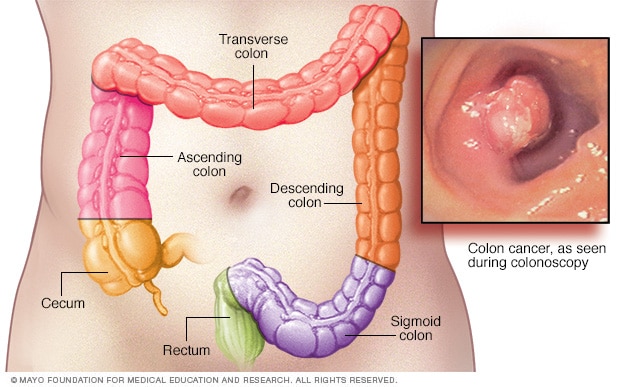Colon Cancer

Symptoms
Symptoms of colon cancer can include:
- A change in bowel habits, such as more frequent diarrhea or constipation.
- Rectal bleeding or blood in the stool.
- Ongoing discomfort in the belly area, such as cramps, gas or pain.
- A feeling that the bowel doesn't empty all the way during a bowel movement.
- Weakness or tiredness.
- Losing weight without trying
Risk Factors
- Older age
- Black race.
- A personal history of colorectal cancer or polyps
- Inflammatory bowel diseases
- Inherited syndromes that increase colon cancer risk. Some DNA changes that increase the risk of colon cancer run in families.
- Family history of colon cancer
- Low-fiber, high-fat diet
- Not exercising regularly
- Diabetes
- Obesity
- Smoking
- Drinking alcohol
Screening
Doctors recommend that people with an average risk of colon cancer consider starting colon cancer screening around age 45. People with an increased risk should think about starting screening sooner.
Tests and procedures to diagnose colon cancer can include:
- Using a scope to examine the inside of the colon.
- Removing a sample of tissue for testing.
- Blood tests.

Prevention
- Eat a variety of fruits, vegetables and whole grains
- Drink alcohol in moderation, if at all
- Stop smoking
- Exercise most days of the week
- Maintain a healthy weight
Mayo Clinic
Colon cancer is a growth of cells that begins in a part of the large intestine called the colon. It usually begins as small clumps of cells called polyps that form inside the colon. Polyps generally aren't cancerous and often don't cause symptoms, but some can turn into colon cancers over time. For this reason, doctors recommend regular screening tests to look for polyps in the colon. Finding and removing polyps helps prevent colon cancer.

Colon cancer is sometimes called colorectal cancer. This term combines colon cancer and rectal cancer, which begins in the rectum.
Click on the following links to learn more about colorectal cancer symptoms, risk factors, and treatment options:
American Cancer Society
Screening Guidelines: The American Cancer Society has developed colorectal cancer screening guidelines for people at average risk as well as people at high risk for colorectal cancer. Find out more by clicking on the link below:
National Cancer Institute
Advances in Colorectal Cancer Research: Researchers are working to advance our understanding of how to prevent, detect, and treat colorectal cancer. They are also looking at what factors influence screening behaviors, how to address disparities and the rising rates of colorectal cancer in younger people.
Please click on the link below, to view highlights of some of the latest colorectal cancer research:
Video Library
 Connect
Connect

 Connect
Connect